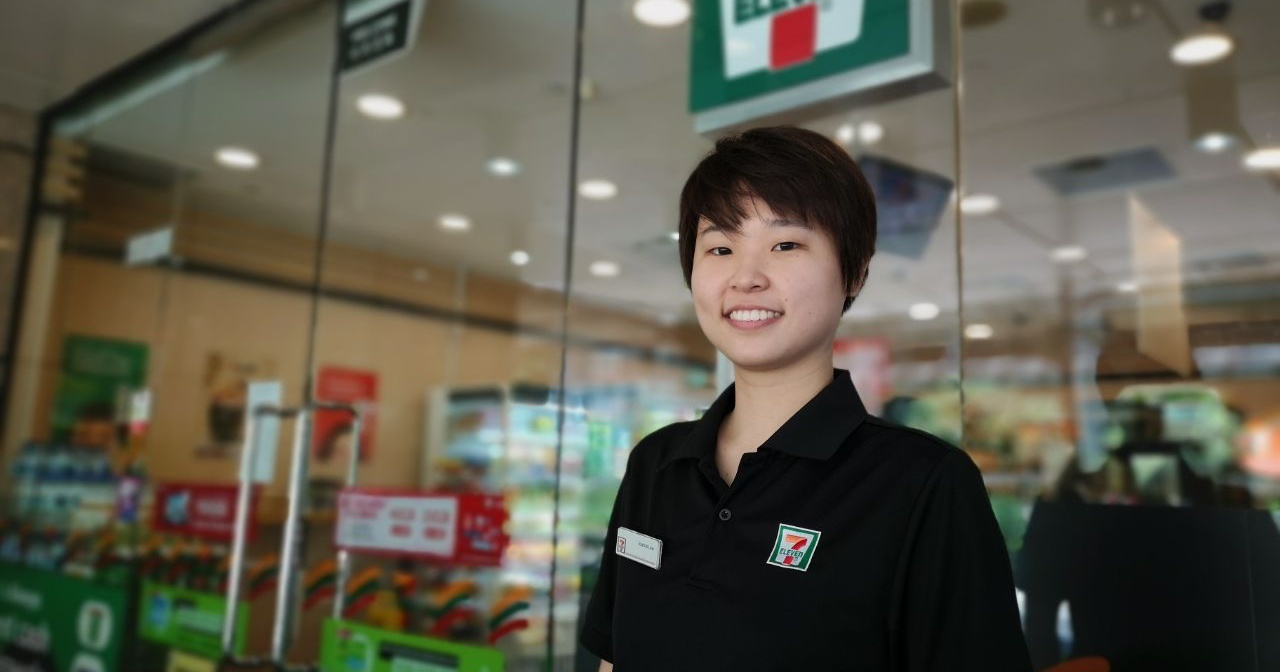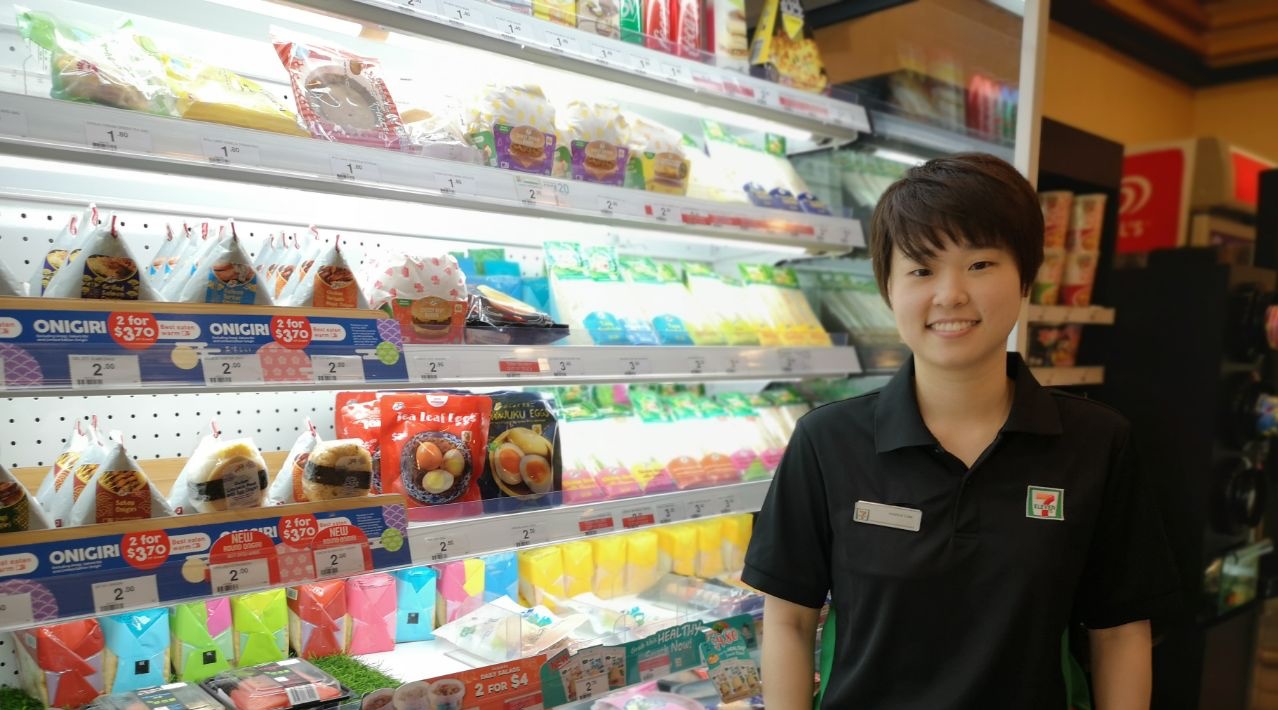This S’porean opened two 7-Eleven stores when she was only 27
It was not an easy road but Cheryl Quak relishes her work as a franchisee.

When I entered the 7-Eleven at 79 Anson Road one Wednesday morning, Cheryl Quak was at the cash register handing over a customer’s change.
While she might look like any ordinary cashier, the energetic 29-year-old is actually the boss of two 7-Eleven convenience stores in the heart of the financial district.
Did not want a desk-bound job
“I’ve always wanted to own a business,” says Quak.
The ex-marketing executive used to work for a petrol company in Singapore and even had a brief stint at a petrol kiosk to experience what it's like manning the cashier, ordering stocks, and being a pump attendant.
And while her time at the company convinced her that she wanted a working experience that wasn’t desk-bound (“I’m more outgoing, I like to go out and meet people!”), her on-the-ground experience with franchisees of the petrol company sparked a desire to have her own business.
And so, at the very tender age of 27, Quak decided to become a 7-Eleven franchisee.
“When I went for the interview, 7-Eleven was actually very concerned because I’m young. They were wary that I wouldn’t be able to manage, especially the human resource and interpersonal issues.”
Supportive parents
Quak is very thankful that her parents — a businessman and a housewife — were mostly supportive of her decision to own 7-Eleven stores.
Quak’s father, in particular, cheered his only daughter on quietly by letting her venture out, make her own mistakes, and grow in the process. “My dad is someone who will let me experience hardship,” she laughs.
“When he sees me working very hard, he will only watch from the side and say, ’Good you suffer, you learn. You need to suffer to learn all these.’”
Quak’s mother, on the other hand, was concerned that her daughter was tying herself down at such a young age.
“’Are you sure? Once you step into this you cannot go overseas, you cannot do this, you cannot do that.’ she warned.”
And yes, indeed there are sacrifices, says Quak.
She does not travel as frequently now (“I used to travel twice or thrice every year.”) and occasionally misses family dinners when she has to cover staff who can’t turn up for work.
“You just need to be mentally prepared for the sacrifices you are going to make,” she shrugs.
Forking out S$80,000 in franchise fees
Quak did her three-month training by shadowing a store manager at a 7-Eleven outlet in Sembawang.
It was a “pretty tough” three months, partly because she did not receive any pay during that period.
In addition, training from nine to five, six days a week meant that she had no time to take on a part-time job outside.
Quak also had to fork out a substantial amount in franchise fees — close to S$80,000 for both stores in Tanjong Pagar.
“At that point in time, you’ll feel very broke lah,” she laughs.
Franchise fees range from S$30,000 to S$100,000 per store depending on the volume of sales a store can generate.
This can be quite a substantial upfront cost, but under its Franchiseprenuer Management Trainee Program (FMTP) for young entrepreneurs, 7-Eleven will waive the franchise fee for up to two 7-Eleven stores.
This can be of great help for young entrepreneurs who do not have much savings to kickstart their franchising dreams.
The catch is that these trainees need to have tertiary education qualifications, and less than six years of working experience to qualify for FMTP.
Currently, trainees in the normal franchise programme will receive a sponsorship fee of $3,000 upon completion of the 3-month training programme.
This sponsorship fee, said 7-Eleven, is a goodwill compensation for the three months that they commit to training.
“Usually they will not give [first-timers] stores that have super high sales, then you cannot manage,” Quak qualifies, adding that franchisees don’t necessarily get a bigger store even if they pay more.
Stores with higher traffic are usually made available to franchisees who have a proven track record.
Learning from the best mentor
Despite being stretched financially, Quak says that she enjoyed her on-the-job training because she had a wonderful mentor, Mugun, who, in her words, was one of the best store managers she had ever met.
“He’s very hardworking. He practically sold his life to his job (laughs). He works 7am to 3pm, and when there is no manpower, he works till 11pm. And the next day, he comes at 7am again.”
Every morning before Quak started her training shift, her mentor would ask if she had eaten.
If she hadn’t, he would take a pack of bread from the shelf, pay for it with his own money, and give it to her.
“Eat first, then you will have your strength to work,” Mugun would say.
Mugun, says Quak, taught her what it means to lead by example.
From Mugun, Quak learned every bit of the store operations — from managing manpower to taking stock, arranging products on the shelves, right down to the paperwork.
7-Eleven even provided Quak with a very nifty calculation of her estimated earnings if she manages to meet a certain volume of sales.
It might seem easy but in reality, things often don’t go according to plan.
Perhaps a machine breaks down or a store assistant does not turn up for work. That’s when a franchisee needs to think on their feet to make sure that operations aren’t affected, says Quak.
Choosing her Tanjong Pagar outlets
Quak was given several outlets to choose from before her training.
With 7-Eleven, she did not need to source for her own location and set up a new store from scratch. Franchisees get to choose and take over a store that has been corporate-run for at least a year.
However, choosing the store itself was a tough decision.
“You got to come out and study the store, look at the area. Is there potential growth?”
Take a 7-Eleven outlet in the heartlands, she says. The surroundings might change quickly. Perhaps a 24-hour supermarket pops up in the vicinity and cannibalises the business.
7-Eleven acknowledges this risk but also points out that it is a non-cyclical business which means that it continues to do well during economic downturns because it provides essential goods and services that sees continuous demand at all times.
It adds that it is one of the rare, few businesses that customers walk into the store ready to spend.
Franchisees don’t even need to source for new products nor handle the marketing programmes as these are done by 7-Eleven. They can just focus on providing quick and friendly service.
Quak eventually settled on her Tanjong Pagar outlets — one located on the ground floor of a 23-storey office building, and the other inside Tanjong Pagar MRT station — because she saw potential growth in the area.
“When I came here, some of the new buildings were not opened yet,” she says.
Today, many of the surrounding office buildings are filled, housing more customers who need their afternoon cup of coffee (“Our Americano is only S$1.50!”) or a quick snack.
In fact, a number of 7-Eleven stores have popped up around her in response to the demand. Last year, another 7-Eleven outlet opened just five minutes away from her Tanjong Pagar MRT station outlet.
“The whole idea is they want it to be convenient,” she says.
Since the price of the goods sold in 7-Eleven stores are standardised across outlets, Quak ensures, in addition to quick and friendly service, that her stores are compliant with 7-Eleven presentation standards and well-stocked to attract customers.
Managing people
“It’s easy to franchise a store, but to manage a store — not so easy,” Quak sighs.
Less time to sleep, less time to eat, and being plagued by stress — that was Quak’s life as a young business owner trying to find her footing.
However she maintains that these experiences, coupled with her willingness to get her hands dirty, trained her to be a better and sharper boss. ”
Less than a year into her business, one of Quak’s staff ran off with her money.
Said staff was a promising young man who always turned up at work on time and always worked overtime without complaint.
One day without warning, he ran off with over S$2,000 from the store and blocked everyone. Till today, Quak hasn’t gotten back her money entirely. Fortunately, there was business insurance to cover the bulk of the losses.
Aside from that, Quak found herself struggling with managing her staff.
“I have encountered [staff] who just tell you, ‘Oh sorry boss I’m not coming into work today.’ Or they just MIA (missing in action) and they don’t even text you.”
It took her a whole year to learn how to hire, manage, and earn the respect of her staff. This, she says, she does by leading by example.
In the store, Quak doesn’t shy away from topping up the shelves, cleaning the store, clearing the trash, and covering shifts.
Other bosses might deem these activities beneath them but she chooses to do them because she treats her staff as fellow team members.
“I want to gain that respect. You respect them, they will respect you,” she says.
Becoming a more confident franchisee
Three years on, Quak is a more confident franchisee but she still busies herself with the day-to-day operations at her stores which rake in a tidy sum each month.
The income varies depending on lull and peak period. For instance, at the end of the year, the financial district tends to be a little quieter.
Most days, she does the ordering for the stocks at both outlets, and helps her staff with the operations.
Her afternoons are spent doing leisurely things like yoga or a museum visit.
 Quak is now a confident franchisee who operates two outlets in the financial district. Image by Joshua Lee.
Quak is now a confident franchisee who operates two outlets in the financial district. Image by Joshua Lee.
Quak’s store has even cultivated a few regulars — a group of Japanese workers who come in every day to buy coffee.
“Sometimes when we don’t see each other, they will ask, ’Eh, where [were] you?’” she smiles.
It is doing relatively well, and she hopes to franchise more stores in the near future.
On advice for people who are looking to be franchisees, Quak says that they should try it out before committing. They should also be prepared to take on unexpected challenges.
“You must have a lot of confidence to manage the business. There are a lot of things that we cannot foresee, and you must be ready to get your hands dirty.”
Readers who are looking for the business opportunity to own a franchise in Singapore can email franchise@7-eleven.com.sg or visit here.
Top image by Joshua Lee. Thanks to this sponsored article by 7-Eleven, our writer is now more appreciative of the work that goes into manning a convenience store.
Comments